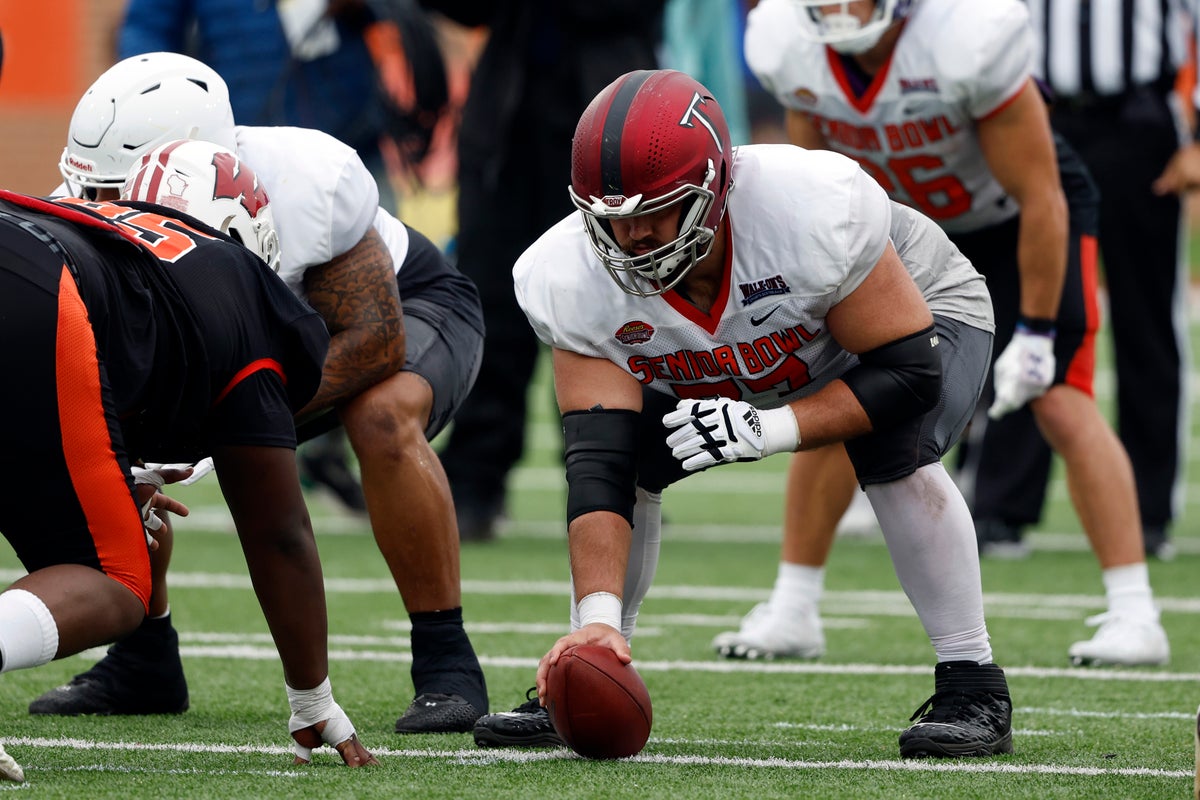
NFL prospect Jake Andrews fielded questions from teams designed to probe his personality and attitude more than just his football IQ.
Those questions — such as, would you rather be a Super Bowl champion or Hall of Famer? — are standard issue for teams vetting potential draft picks leading up to all-star games like Saturday’s Senior Bowl and at the NFL combine. What aren’t deemed acceptable anymore: the outlier questions that a player might find demeaning or embarrassing, a nod to the greater attention being paid to mental health concerns among athletes.
Andrews, a Troy offensive lineman, and other players said former NFL running back Brian Westbrook spoke this week emphasizing the changes in the 21 years since he arrived in the league.
“When he first got in the league, if you wanted to see a psychiatrist or something, if you were having a down day, when it was time to negotiate that next contract, you knew (general managers) were going to bring that up,” Andrews said. “And that stuff just can’t happen in this day and age.
“I think it’s a good thing. A lot of people struggle with mental health and it’s really important to keep that in check. The questions can really expose people, so I think it’s a good thing that they protect us.”
The league warned teams in a memo last January they could be forced to forfeit a draft pick between the first and fourth round and be fined a minimum of $150,000 for out-of-bounds questions. Individual club employees could also face fines or suspensions.
There have been isolated reports in recent years of inappropriate questions being asked of draft prospects.
In 2010, then-Miami Dolphins general manager Jeff Ireland apologized to Dallas Cowboys first-round draft pick Dez Bryant for asking during a pre-draft visit whether his mother was a prostitute.
In 2016, then-Atlanta Falcons coach Dan Quinn apologized to Eli Apple because one of his coaches asked the cornerback about his sexual preference.
Two years later, former LSU running back Derrius Guice said one team at the combine asked about his sexuality and another inquired if his mother was a prostitute.
“Whether you’re a professional athlete or not, there’s a level of dignity and respect that comes with an interview,” NFL executive Troy Vincent said at the owners meetings in December. “I think we all can appreciate that.
“Sometimes they (players) share things with you and you scratch your head. Other times, you’re embarrassed. These are things we can fix.”
Mental health professionals say the move is a step forward at a time when the spotlight has shined on the psychological well-being of athletes like Olympians Simone Biles and Michael Phelps, NBA star Kevin Love and former NFL receiver Brandon Marshall.
“Certainly, organizations look to protect their integrity and financial investments in players,” Dr. Stephen Ferrando, director of psychiatry for the Westchester Medical Center Health Network in New York, wrote in an email. “The efforts to uncover such problems, however, do not justify intrusive questioning of athletes. In fact, such questioning is likely to lead athletes to hide their problems out of fear of reprisal.
“Furthermore, such intrusive questioning may be based on assumptions, and this is likely to compound negative emotions. The NFL has taken a major step to reinforce boundaries when interviewing players.”
Joshua Norman, a psychiatrist at Ohio State Wexner Medical Center, said “it’s important to preserve prospective employees’ dignity” in any type of job interview.
“Throughout the years in the NFL, there was always these kinds of offhand questions coming out of the interview process as college prospects were coming up through the ranks,” said Norman, who works with Buckeyes athletes. “I think it’s good they’re putting a little bit of structure behind that to kind of preserve players’ dignity. And also to be respectful of any type of mental health condition.”
Both Ferrando and Norman said studies have shown that athletes have about the same incidence of mental health struggles as the rest of the population.
Illinois safety Sydney Brown is OK with facing tough questions from NFL teams, saying his worst infractions amount to old parking or speeding tickets.
“I think at the end of the day as a player, you’ve got to be ready for those questions and whatever you’ve done in your history is going to trail with you,” said Brown, playing in the Senior Bowl along with teammate and brother Chase Brown.
“If they’re not asked today, they’re going to be asked eventually. It’s nice that they have our backs, but these are informal job interviews. This is football, right? You’ve just got to be ready for anything that’s thrown your way.”
Kansas defensive end Lonnie Phelps said he hasn’t been asked any questions that struck him as wrong, but he appreciates the efforts to protect players.
“I see that they actually care about the players’ mental health,” Phelps said. “They’ve got psychiatrists and stuff like that for free.
“They really care about the mental health.”
___
AP Sports Writer Schuyler Dixon in Irving, Texas, contributed to this report.







